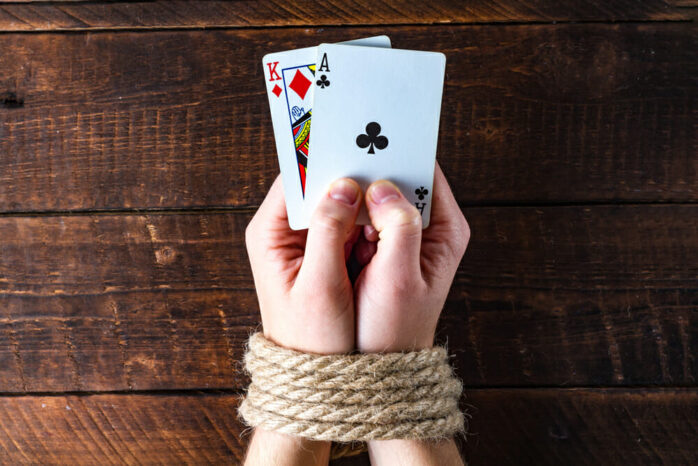
This year, the NHS revealed that they will be launching two new clinics in England which will be the Service’s answer to the high demand for gambling treatment in the country. With five specialist treatment centres already working, with the two new which will open in Southampton and Stoke-On-Trent this May, the total number of clinics dedicated to problem gambling becomes seven. However, is this really enough to battle the severe gambling addiction problem in the UK?
We asked addiction experts from substancerehabilitation.com a leader in addiction rehab, about the current state of gambling addiction in the country according to their experience as a provider.
What Is Gambling Addiction?

Betting, waging, risk-taking, pay-per-win games, gacha games, loot boxes (both in gaming and physical mail-order ones)… Online and offline, we are exposed to constant gambling triggers. And if you’re not careful, these can quickly turn into addictive behaviours.
The World Health Organization defines gambling addiction as “a condition characterized by impaired control over gambling behaviour, leading to clinically significant impairment or distress”. This includes both pathological gamblers who have lost all control over their betting habits, and those who gamble excessively but do not meet the criteria for Pathological Gambling.
In fact, it has been estimated that around 1% of people worldwide suffer from some form of gambling disorder. But what exactly causes someone to develop a gambling addiction? It’s actually quite complicated. Some studies suggest that genetics play a role: one study found that family members of addicts were more likely to become addicted themselves than non-family members. Others believe that environmental factors also play a part: childhood trauma, sexual abuse, and even exposure to certain medications may contribute to developing a gambling addiction.
However, there are many other contributing factors too. For example, research suggests that people with low self-esteem tend to be more vulnerable to becoming addicted to gambling. In addition, people who are prone to stress are also more likely to develop a gambling addiction.
The Current State of Things

According to the Gambling Commission, as of March 2024, overall participation in gambling activity increased to 43% (an increase of 3 percentage points compared to the same period in 2024). In addition, their surveys revealed that with the return of availability, the participation in in-person gambling such as lotteries, sports betting, fruit and slot machines, horses, and bingo is increasing compared to 2024’s results. Although the numbers are lower than pre-pandemic data, there are growing tendencies.
Taking the pandemic and the hit in-person gambling took during the lockdowns, the British community often partakes in gambling activities, with over 90% of the horseracing audience participating in a type of betting during the season. Other sports where audiences often bet are boxing, tennis, football and rugby.
With the legislation changes from several years ago, the UK sees a constant increase in overall gambling activities. In 2018, data claims, the British gambling industry accumulated over £14.4 billion. Data then showed that 32% of the entire population gamble every week.
With this in mind, we asked Substance Rehabilitation UK about how the two new clinics will help in the long run.
We Need to Keep Raising Awareness

The addiction experts at their facilities are seeing an increase in people looking for private residential rehabilitation for betting habits and problem gambling. This is first of all because of the increase in activities mentioned above, but also because the NHS services are struggling to provide timely help for those looking for NHS-funded options. Hence, they turn to private providers instead. While the benefits of immediate admissions and better client-staff ratios are obvious, looking for a rehab and finding the best service is sometimes overwhelming for people suffering from gambling-related financial difficulties.
In fact, it’s estimated that around 10 million Britons have some kind of gambling addiction. The National Centre for Social Research estimates that nearly half of them do not seek any form of treatment. This means that they end up being responsible for their own recovery. However, if they choose to get professional help, they can find a number of different centres offering different treatments.
It’s important to note that while there are no official statistics on how many people suffer from gambling addictions, it’s believed that between 5% and 8% of the adult population has gambled at least once in their lives. Of course, this doesn’t mean that everyone with a gambling habit suffers from an addiction. It simply means that there are a lot of people who need help.

Every gambling treatment provider looks into ways to raise awareness by speaking about problem gambling, participating in seminars and conventions, as well as looking for various ways to make private treatment available to more people. Thanks to these efforts, insurance companies are looking more into adding addiction treatment for problem gambling to their list of options. However, with it being a rather recent diagnosis, it may be necessary to speak to your insurer specifically about their policies before privately engaging with a treatment clinic.
Speaking to your insurer will make them aware of the need for coverage if they do not offer it at this moment. The more we are open about our needs, the more help we will be able to get to heal, to succeed, to overcome the barriers of problem gambling.






